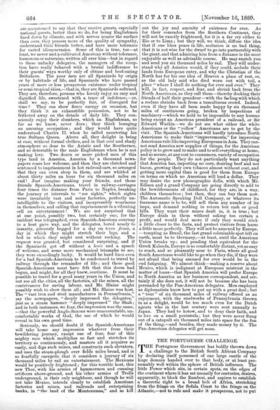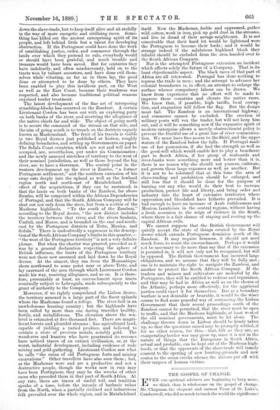THE PORTUGUESE CHALLENGE.
7r7, challenge to the British South African Company Portuguese Government has boldly thrown down by declaring itself possessed of one large cantle of the linge domain handed over to that body, or at least pre- sumably well within the sphere of British influence. The little Power which sits, in certain spots, on the edges of the continent where it has sat uneasily for centuries, desires, apparently, to block the Zambesi, and aspires to establish a theoretic right to a broad belt of Africa, stretching from the fringe on the Sofala Coast to the fringe on the Atlantic,—not to rule and make it prosperous, not to put down the slave-trade, but to keep itself alive and sit stolidly in the way of more energetic and civilising races. Some- thing has killed out the ancient enterprising spirit of its people, and. left behind little but a talent for developing obstruction. If the Portuguese could have done the work of establishing justice, order, and commerce through the lands over which they pretend to rule, everybody would or should have been grateful, and much trouble and treasure would have been saved. But for centuries they have indolently, and often mischievously, held on to the tracts won by valiant ancestors, and have done evil them- selves while vitiating, as far as in them lay, the good done or attempted to be done by others. They have been enabled to play this invidious part, on the West as well as the East Coast, because their weakness was respected, and also because traditional political reasons enjoined tender treatment.
The latest development of the fine art of interposing stumbling-blocks has occurred on the Zambesi. A certain Lieutenant Cordon has been out with an exploring party on both banks of the river, and receiving the allegiance of the native chiefs far and wide. The object of going north is to secure the command of the stream on that side, and the aim of going south is to trench on the districts vaguely known as Mashonaland. The fruit of his travels is visible in two Royal decrees just published at Lisbon, roughly defining boundaries, and setting up Governments on paper. The Sofala Coast countries, which are not and will not be occupied, are, nevertheless, put under six Commissaries ; and the newly annexed stretches of territory to the west of their nominal jurisdiction, as well as those beyond the big river, are to have a Governor. The central point in the western development up the river is Zumbo, "a former Portuguese settlement," and the southern extension of his sway eats deeply into the upland as well as the lowland region north and north-east of Matabeleland. The effect of the acquisitions, if they can be sustained, is that the lands on both banks of the Zambesi, far above Zumbo, will be comprised within the African Dependencies of Portugal, and that the South African Company will be shut out not only from the river, but from a section of the Mashona highlands. "To the south of the Zambesi," according to the Royal decree, "the new district includes the territory between that river, and the rivers Sanhata, ITmfuli, and Mazoe, and is bounded on the east and south- east by the Portuguese districts of Tette, Monica, and Sofala." There is undoubtedly a vagueness in the descrip- tion of the South African Company's limits in this quarter,— " the west of the Portuguese territory" is not a very definite phrase. But when the charter was granted, preceded as it was by a general declaration respecting the sphere of British influence, the limits of the Portuguese territory were not those now assumed and laid down by the Royal decree. At the utmost, they ran from the Mozambique shore northward to some point near or above Tett,e, and lay eastward of the area through which Lieutenant Cordon made his way, receiving allegiance, and so on. It is there- fore, presumably at least, an encroachment upon tracts nominally subject to Lobengula, made subsequently to the grant of authority to the Company.
Moreover, if we rightly comprehend the Lisbon decree, the territory annexed is a large part of the finest uplands where the Mashonas found a refuge. The river-belt is an unwholesome hunting country ; but the highlands have been called by more than one daring traveller healthy, fertile, and metalliferous. The elevation above the sea- level is estimated at five thousand feet. There are magni- ficent forests and plentiful streams ; fine agricultural land, capable of yielding a varied produce, and believed to contain a store of precious metals, notably gold. The wanderers and hunters who have penetrated its recesses have noticed traces of an extinct civilisation, or, at the worst, industrial development, including evidence of rude mining and gold-gathering. Lieutenant Cordon saw what he calls "the ruins of old Portuguese forts and mining excavations." Other travellers have also seen them ; but, as the Mashonas were and are a productive and not a destructive people, though the works now in ruin may have been Portuguese, they may be the wrecks of other races who preceded them in that part of South Africa. At any rate, there are traces of useful toil, and tradition speaks of a time, before the inroads of barbaric tribes from the North, when a partially civilised and industrious folk prevailed over the whole region, and in Matabeleland itself. Now the Mashonas, feeble and oppressed, gather wild cotton, work in iron, pick up gold dust in the streams, and live in dread of their savage neighbours. It is not conceivable that their hard lot would be lightened were the Portuguese to become their lords ; and it would be strange indeed if the salubrious highland block they inhabit should be excluded from the area handed over to the South African Company. Nor is the attempted Portuguese extension an incident which affects solely the future of a Company. That is its least objectionable aspect. The black races of that part of Africa are all interested. Portugal has done nothing to repress the trade in men ; and the attempt to advance her colonial boundaries is, in effect, an attempt.to enlarge the surface whence compulsory labour can be drawn. We know from experience that no effort will be made to improve these countries and elevate the native races. We know that, if possible, high tariffs, local corrup- tion, and stagnation will follow the flag. But the design must fall. The Zambesi is an international highway, and commerce cannot be excluded. The erection of military posts will vex the trader, but will not keep him out, and it will be something new if the expansive spirit of modern enterprise allows a merely obstructionist policy to prevent the fruitful use of a great line of river communica- tion. We must have free access to the ShirtS, and the upper waters of the Zambesi below the falls. If Portugal made use of her possessions, if she had the strength as well as the good-will which would enable her to play a beneficent part in South Africa, if her grasp of seaboards and river-banks were something more and better than it is, there is no reason why she should not possess, cultivate, and govern these large expanses as well as another. But it is not to be tolerated that at this time the area of slave-trading and prohibition should be enlarged, and still less that it should be done for the purpose of barring out any who would do their best to increase production, protect life and liberty, and bring order and industry into the heart of extensive territories where oppression and bloodshed have hitherto prevailed. It is bad enough to have an increase of Arab ruthlessness and Moslem fanaticism in the central regions, without having a fresh accession to the reign of violence in the South, where there is a fair chance of staying and rooting up the capital African evils. We cannot suppose that the British Government will quietly accept the state of things created by the Royal decree which extends Portuguese dominion south of the Zambesi. It may require firmness, it should not need much force, to resist the encroachment. Perhaps it would nat be necessary to do more than say that if the extension is persisted in, it will not only not be recognised, but will be opposed. The British Government has incurred large obligations, and we assume that they will be fully met ; one is to maintain the right to navigate the Zambesi, and another to protect the South African Company. If the traders and miners and cultivators are molested by the Portuguese, they will be entitled to redress and reparation, and that may be had in Africa as well as on the shores of the Atlantic, perhaps more effectively, for the aggrieved parties could exact it for themselves. But as a boundary warfare is not desirable or bearable, it would be the wiser course to find some peaceful way of convincing the Lisbon Government that their recent proceedings south of the Zambesi cannot be permitted, that the river must be open to traffic, and that the Mashona highlands, at least west of the old nominal governments, must be let alone. The challenge thrown down in Lisbon should be firmly taken up, so that the questions raised may be promptly settled, if for no other reason, for this,—that, left as they are, an exasperating border war may grow up, since it is not in the nature of things that the Europeans in South Africa, actual and probable, can be kept out of the Mashona high. lands, or that the opponents of the slave-trade will tamely consent to the opening of new hunting-grounds and new routes to the ocean creeks whence the slavers put off with their cargoes of human victims.



















































 Previous page
Previous page